Psychology Homework Assignment: Principles of Learning and Memory
VerifiedAdded on 2022/08/14
|5
|1452
|11
Homework Assignment
AI Summary
This psychology assignment provides detailed answers to a range of questions covering fundamental concepts in the field. The assignment begins with an explanation of classical conditioning, including its principles, and then moves on to operant conditioning, exploring reinforcement schedules. It delves into the Rescorla Wagner model, latent learning, and the differences between intrinsic and extrinsic motivation. The assignment also discusses the Bobo doll experiment and its implications, the roles of the frontal lobes and hippocampus in memory, and long-term potentiation. Furthermore, it examines the influence of mood-state on memory recall, the distinction between implicit and explicit memory, and the concept of effortful processing. The assignment concludes with discussions of levels of processing and the effects of age on memory recall. References are included for further research.
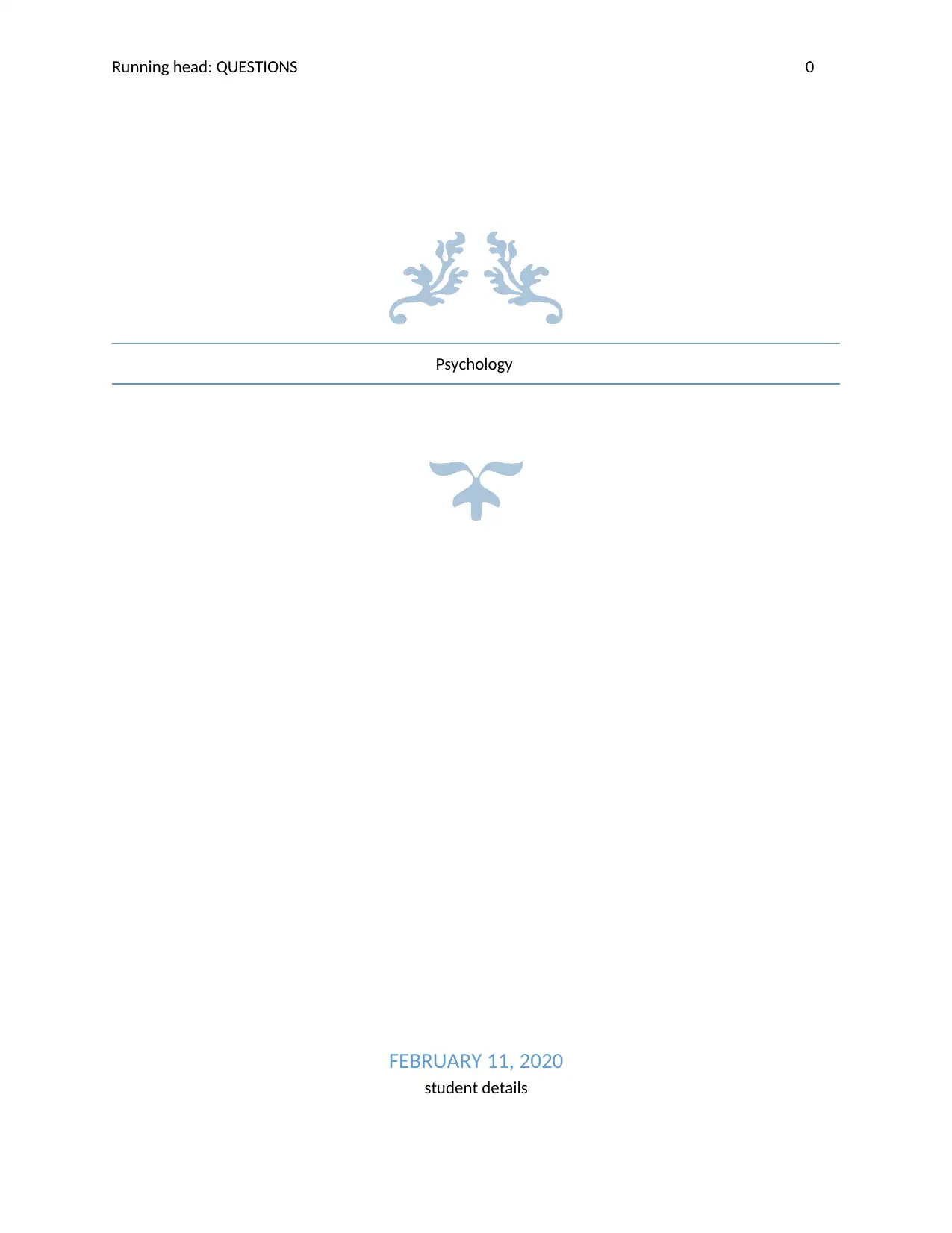
Running head: QUESTIONS 0
Psychology
FEBRUARY 11, 2020
student details
Psychology
FEBRUARY 11, 2020
student details
Paraphrase This Document
Need a fresh take? Get an instant paraphrase of this document with our AI Paraphraser
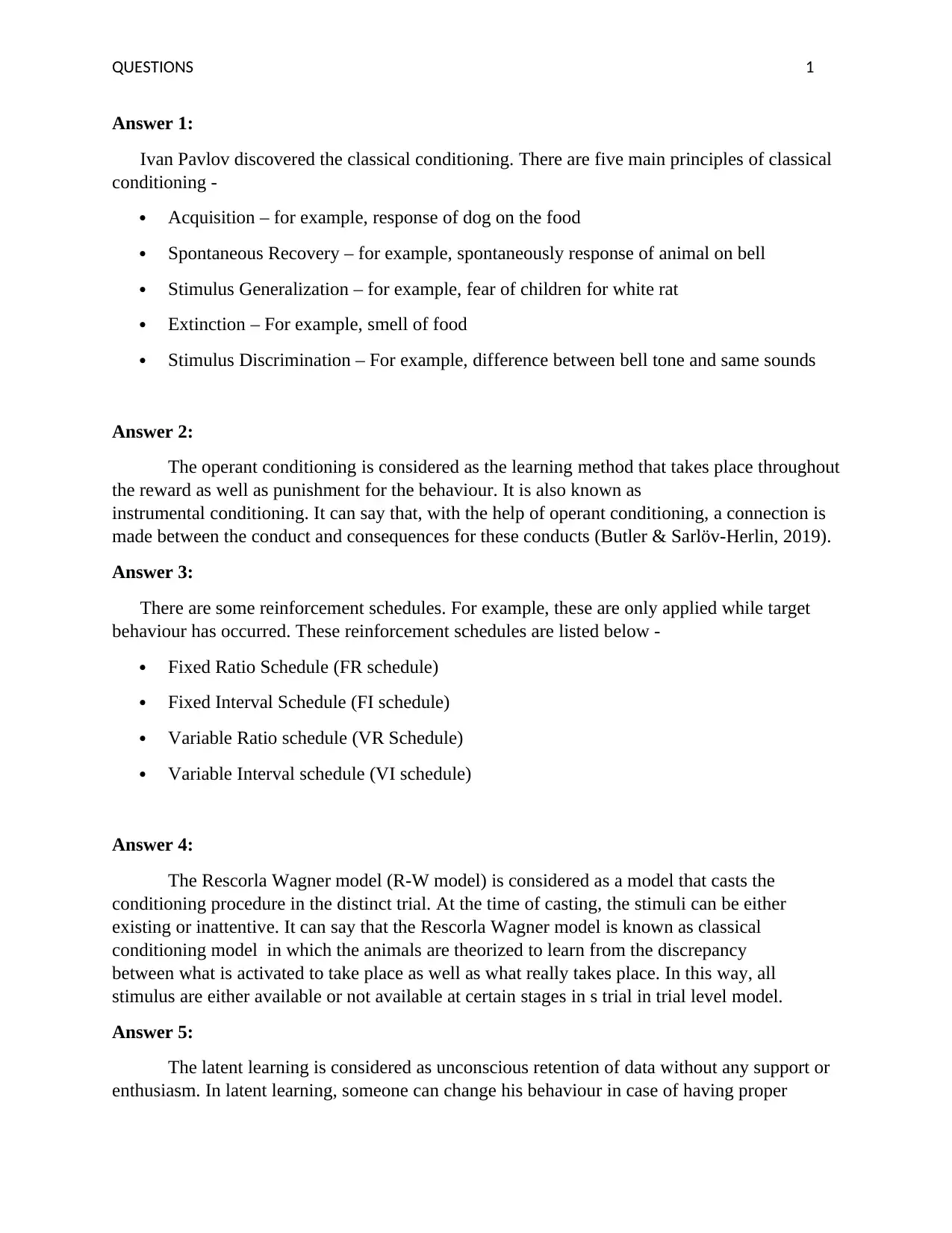
QUESTIONS 1
Answer 1:
Ivan Pavlov discovered the classical conditioning. There are five main principles of classical
conditioning -
Acquisition – for example, response of dog on the food
Spontaneous Recovery – for example, spontaneously response of animal on bell
Stimulus Generalization – for example, fear of children for white rat
Extinction – For example, smell of food
Stimulus Discrimination – For example, difference between bell tone and same sounds
Answer 2:
The operant conditioning is considered as the learning method that takes place throughout
the reward as well as punishment for the behaviour. It is also known as
instrumental conditioning. It can say that, with the help of operant conditioning, a connection is
made between the conduct and consequences for these conducts (Butler & Sarlöv-Herlin, 2019).
Answer 3:
There are some reinforcement schedules. For example, these are only applied while target
behaviour has occurred. These reinforcement schedules are listed below -
Fixed Ratio Schedule (FR schedule)
Fixed Interval Schedule (FI schedule)
Variable Ratio schedule (VR Schedule)
Variable Interval schedule (VI schedule)
Answer 4:
The Rescorla Wagner model (R-W model) is considered as a model that casts the
conditioning procedure in the distinct trial. At the time of casting, the stimuli can be either
existing or inattentive. It can say that the Rescorla Wagner model is known as classical
conditioning model in which the animals are theorized to learn from the discrepancy
between what is activated to take place as well as what really takes place. In this way, all
stimulus are either available or not available at certain stages in s trial in trial level model.
Answer 5:
The latent learning is considered as unconscious retention of data without any support or
enthusiasm. In latent learning, someone can change his behaviour in case of having proper
Answer 1:
Ivan Pavlov discovered the classical conditioning. There are five main principles of classical
conditioning -
Acquisition – for example, response of dog on the food
Spontaneous Recovery – for example, spontaneously response of animal on bell
Stimulus Generalization – for example, fear of children for white rat
Extinction – For example, smell of food
Stimulus Discrimination – For example, difference between bell tone and same sounds
Answer 2:
The operant conditioning is considered as the learning method that takes place throughout
the reward as well as punishment for the behaviour. It is also known as
instrumental conditioning. It can say that, with the help of operant conditioning, a connection is
made between the conduct and consequences for these conducts (Butler & Sarlöv-Herlin, 2019).
Answer 3:
There are some reinforcement schedules. For example, these are only applied while target
behaviour has occurred. These reinforcement schedules are listed below -
Fixed Ratio Schedule (FR schedule)
Fixed Interval Schedule (FI schedule)
Variable Ratio schedule (VR Schedule)
Variable Interval schedule (VI schedule)
Answer 4:
The Rescorla Wagner model (R-W model) is considered as a model that casts the
conditioning procedure in the distinct trial. At the time of casting, the stimuli can be either
existing or inattentive. It can say that the Rescorla Wagner model is known as classical
conditioning model in which the animals are theorized to learn from the discrepancy
between what is activated to take place as well as what really takes place. In this way, all
stimulus are either available or not available at certain stages in s trial in trial level model.
Answer 5:
The latent learning is considered as unconscious retention of data without any support or
enthusiasm. In latent learning, someone can change his behaviour in case of having proper
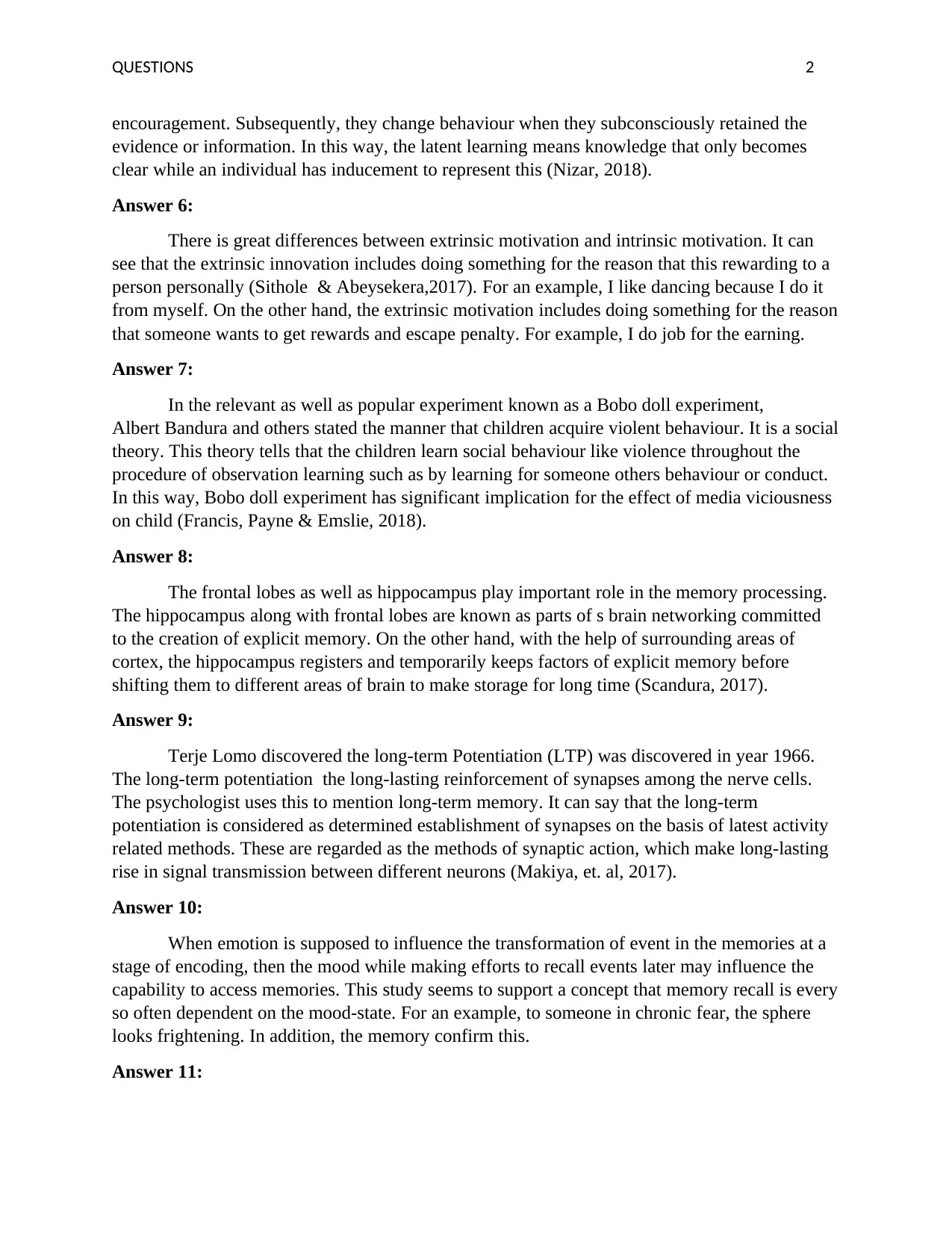
QUESTIONS 2
encouragement. Subsequently, they change behaviour when they subconsciously retained the
evidence or information. In this way, the latent learning means knowledge that only becomes
clear while an individual has inducement to represent this (Nizar, 2018).
Answer 6:
There is great differences between extrinsic motivation and intrinsic motivation. It can
see that the extrinsic innovation includes doing something for the reason that this rewarding to a
person personally (Sithole & Abeysekera,2017). For an example, I like dancing because I do it
from myself. On the other hand, the extrinsic motivation includes doing something for the reason
that someone wants to get rewards and escape penalty. For example, I do job for the earning.
Answer 7:
In the relevant as well as popular experiment known as a Bobo doll experiment,
Albert Bandura and others stated the manner that children acquire violent behaviour. It is a social
theory. This theory tells that the children learn social behaviour like violence throughout the
procedure of observation learning such as by learning for someone others behaviour or conduct.
In this way, Bobo doll experiment has significant implication for the effect of media viciousness
on child (Francis, Payne & Emslie, 2018).
Answer 8:
The frontal lobes as well as hippocampus play important role in the memory processing.
The hippocampus along with frontal lobes are known as parts of s brain networking committed
to the creation of explicit memory. On the other hand, with the help of surrounding areas of
cortex, the hippocampus registers and temporarily keeps factors of explicit memory before
shifting them to different areas of brain to make storage for long time (Scandura, 2017).
Answer 9:
Terje Lomo discovered the long-term Potentiation (LTP) was discovered in year 1966.
The long-term potentiation the long-lasting reinforcement of synapses among the nerve cells.
The psychologist uses this to mention long-term memory. It can say that the long-term
potentiation is considered as determined establishment of synapses on the basis of latest activity
related methods. These are regarded as the methods of synaptic action, which make long-lasting
rise in signal transmission between different neurons (Makiya, et. al, 2017).
Answer 10:
When emotion is supposed to influence the transformation of event in the memories at a
stage of encoding, then the mood while making efforts to recall events later may influence the
capability to access memories. This study seems to support a concept that memory recall is every
so often dependent on the mood-state. For an example, to someone in chronic fear, the sphere
looks frightening. In addition, the memory confirm this.
Answer 11:
encouragement. Subsequently, they change behaviour when they subconsciously retained the
evidence or information. In this way, the latent learning means knowledge that only becomes
clear while an individual has inducement to represent this (Nizar, 2018).
Answer 6:
There is great differences between extrinsic motivation and intrinsic motivation. It can
see that the extrinsic innovation includes doing something for the reason that this rewarding to a
person personally (Sithole & Abeysekera,2017). For an example, I like dancing because I do it
from myself. On the other hand, the extrinsic motivation includes doing something for the reason
that someone wants to get rewards and escape penalty. For example, I do job for the earning.
Answer 7:
In the relevant as well as popular experiment known as a Bobo doll experiment,
Albert Bandura and others stated the manner that children acquire violent behaviour. It is a social
theory. This theory tells that the children learn social behaviour like violence throughout the
procedure of observation learning such as by learning for someone others behaviour or conduct.
In this way, Bobo doll experiment has significant implication for the effect of media viciousness
on child (Francis, Payne & Emslie, 2018).
Answer 8:
The frontal lobes as well as hippocampus play important role in the memory processing.
The hippocampus along with frontal lobes are known as parts of s brain networking committed
to the creation of explicit memory. On the other hand, with the help of surrounding areas of
cortex, the hippocampus registers and temporarily keeps factors of explicit memory before
shifting them to different areas of brain to make storage for long time (Scandura, 2017).
Answer 9:
Terje Lomo discovered the long-term Potentiation (LTP) was discovered in year 1966.
The long-term potentiation the long-lasting reinforcement of synapses among the nerve cells.
The psychologist uses this to mention long-term memory. It can say that the long-term
potentiation is considered as determined establishment of synapses on the basis of latest activity
related methods. These are regarded as the methods of synaptic action, which make long-lasting
rise in signal transmission between different neurons (Makiya, et. al, 2017).
Answer 10:
When emotion is supposed to influence the transformation of event in the memories at a
stage of encoding, then the mood while making efforts to recall events later may influence the
capability to access memories. This study seems to support a concept that memory recall is every
so often dependent on the mood-state. For an example, to someone in chronic fear, the sphere
looks frightening. In addition, the memory confirm this.
Answer 11:
⊘ This is a preview!⊘
Do you want full access?
Subscribe today to unlock all pages.

Trusted by 1+ million students worldwide
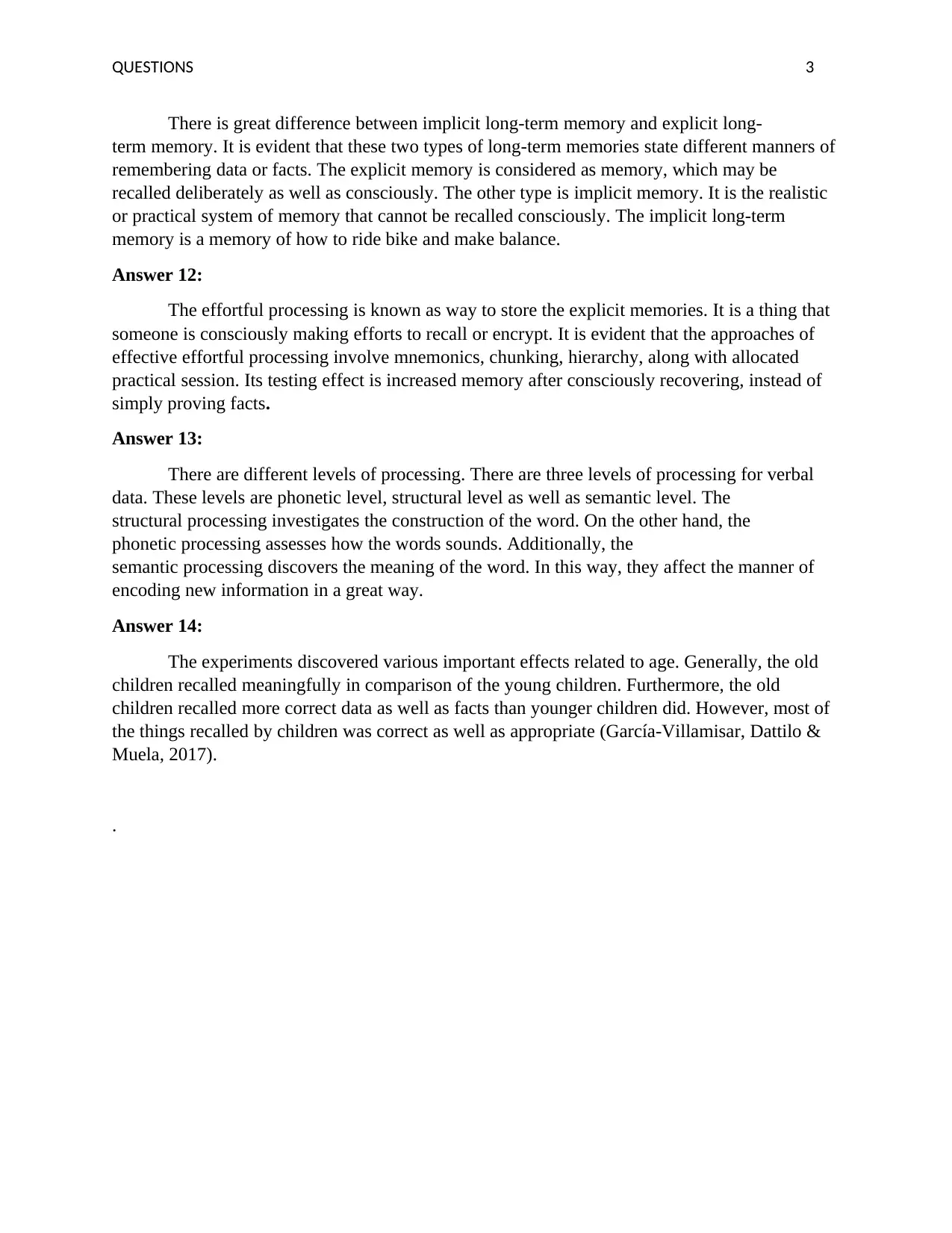
QUESTIONS 3
There is great difference between implicit long-term memory and explicit long-
term memory. It is evident that these two types of long-term memories state different manners of
remembering data or facts. The explicit memory is considered as memory, which may be
recalled deliberately as well as consciously. The other type is implicit memory. It is the realistic
or practical system of memory that cannot be recalled consciously. The implicit long-term
memory is a memory of how to ride bike and make balance.
Answer 12:
The effortful processing is known as way to store the explicit memories. It is a thing that
someone is consciously making efforts to recall or encrypt. It is evident that the approaches of
effective effortful processing involve mnemonics, chunking, hierarchy, along with allocated
practical session. Its testing effect is increased memory after consciously recovering, instead of
simply proving facts.
Answer 13:
There are different levels of processing. There are three levels of processing for verbal
data. These levels are phonetic level, structural level as well as semantic level. The
structural processing investigates the construction of the word. On the other hand, the
phonetic processing assesses how the words sounds. Additionally, the
semantic processing discovers the meaning of the word. In this way, they affect the manner of
encoding new information in a great way.
Answer 14:
The experiments discovered various important effects related to age. Generally, the old
children recalled meaningfully in comparison of the young children. Furthermore, the old
children recalled more correct data as well as facts than younger children did. However, most of
the things recalled by children was correct as well as appropriate (García‐Villamisar, Dattilo &
Muela, 2017).
.
There is great difference between implicit long-term memory and explicit long-
term memory. It is evident that these two types of long-term memories state different manners of
remembering data or facts. The explicit memory is considered as memory, which may be
recalled deliberately as well as consciously. The other type is implicit memory. It is the realistic
or practical system of memory that cannot be recalled consciously. The implicit long-term
memory is a memory of how to ride bike and make balance.
Answer 12:
The effortful processing is known as way to store the explicit memories. It is a thing that
someone is consciously making efforts to recall or encrypt. It is evident that the approaches of
effective effortful processing involve mnemonics, chunking, hierarchy, along with allocated
practical session. Its testing effect is increased memory after consciously recovering, instead of
simply proving facts.
Answer 13:
There are different levels of processing. There are three levels of processing for verbal
data. These levels are phonetic level, structural level as well as semantic level. The
structural processing investigates the construction of the word. On the other hand, the
phonetic processing assesses how the words sounds. Additionally, the
semantic processing discovers the meaning of the word. In this way, they affect the manner of
encoding new information in a great way.
Answer 14:
The experiments discovered various important effects related to age. Generally, the old
children recalled meaningfully in comparison of the young children. Furthermore, the old
children recalled more correct data as well as facts than younger children did. However, most of
the things recalled by children was correct as well as appropriate (García‐Villamisar, Dattilo &
Muela, 2017).
.
Paraphrase This Document
Need a fresh take? Get an instant paraphrase of this document with our AI Paraphraser
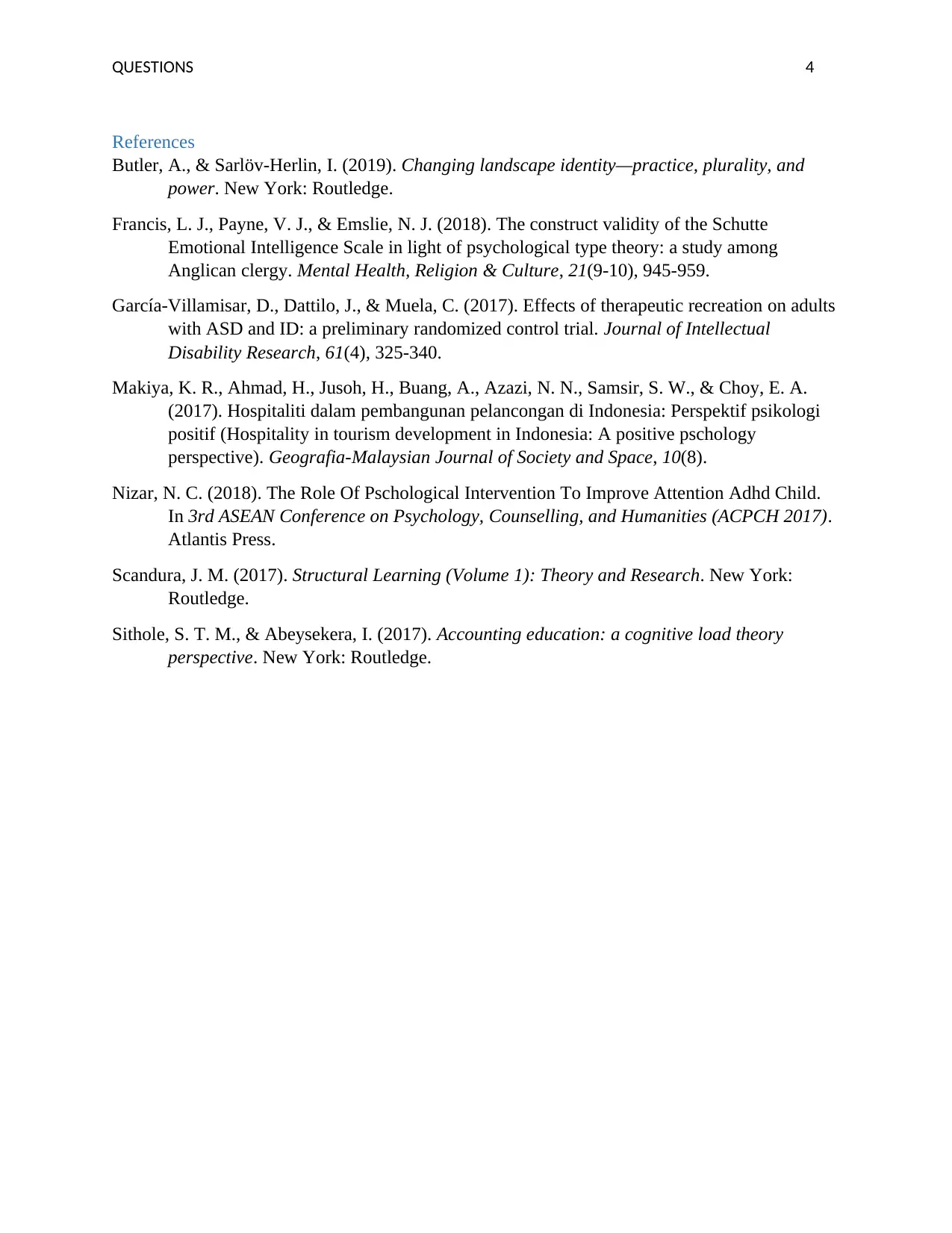
QUESTIONS 4
References
Butler, A., & Sarlöv-Herlin, I. (2019). Changing landscape identity—practice, plurality, and
power. New York: Routledge.
Francis, L. J., Payne, V. J., & Emslie, N. J. (2018). The construct validity of the Schutte
Emotional Intelligence Scale in light of psychological type theory: a study among
Anglican clergy. Mental Health, Religion & Culture, 21(9-10), 945-959.
García‐Villamisar, D., Dattilo, J., & Muela, C. (2017). Effects of therapeutic recreation on adults
with ASD and ID: a preliminary randomized control trial. Journal of Intellectual
Disability Research, 61(4), 325-340.
Makiya, K. R., Ahmad, H., Jusoh, H., Buang, A., Azazi, N. N., Samsir, S. W., & Choy, E. A.
(2017). Hospitaliti dalam pembangunan pelancongan di Indonesia: Perspektif psikologi
positif (Hospitality in tourism development in Indonesia: A positive pschology
perspective). Geografia-Malaysian Journal of Society and Space, 10(8).
Nizar, N. C. (2018). The Role Of Pschological Intervention To Improve Attention Adhd Child.
In 3rd ASEAN Conference on Psychology, Counselling, and Humanities (ACPCH 2017).
Atlantis Press.
Scandura, J. M. (2017). Structural Learning (Volume 1): Theory and Research. New York:
Routledge.
Sithole, S. T. M., & Abeysekera, I. (2017). Accounting education: a cognitive load theory
perspective. New York: Routledge.
References
Butler, A., & Sarlöv-Herlin, I. (2019). Changing landscape identity—practice, plurality, and
power. New York: Routledge.
Francis, L. J., Payne, V. J., & Emslie, N. J. (2018). The construct validity of the Schutte
Emotional Intelligence Scale in light of psychological type theory: a study among
Anglican clergy. Mental Health, Religion & Culture, 21(9-10), 945-959.
García‐Villamisar, D., Dattilo, J., & Muela, C. (2017). Effects of therapeutic recreation on adults
with ASD and ID: a preliminary randomized control trial. Journal of Intellectual
Disability Research, 61(4), 325-340.
Makiya, K. R., Ahmad, H., Jusoh, H., Buang, A., Azazi, N. N., Samsir, S. W., & Choy, E. A.
(2017). Hospitaliti dalam pembangunan pelancongan di Indonesia: Perspektif psikologi
positif (Hospitality in tourism development in Indonesia: A positive pschology
perspective). Geografia-Malaysian Journal of Society and Space, 10(8).
Nizar, N. C. (2018). The Role Of Pschological Intervention To Improve Attention Adhd Child.
In 3rd ASEAN Conference on Psychology, Counselling, and Humanities (ACPCH 2017).
Atlantis Press.
Scandura, J. M. (2017). Structural Learning (Volume 1): Theory and Research. New York:
Routledge.
Sithole, S. T. M., & Abeysekera, I. (2017). Accounting education: a cognitive load theory
perspective. New York: Routledge.
1 out of 5
Your All-in-One AI-Powered Toolkit for Academic Success.
+13062052269
info@desklib.com
Available 24*7 on WhatsApp / Email
![[object Object]](/_next/static/media/star-bottom.7253800d.svg)
Unlock your academic potential
Copyright © 2020–2026 A2Z Services. All Rights Reserved. Developed and managed by ZUCOL.